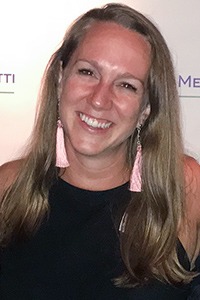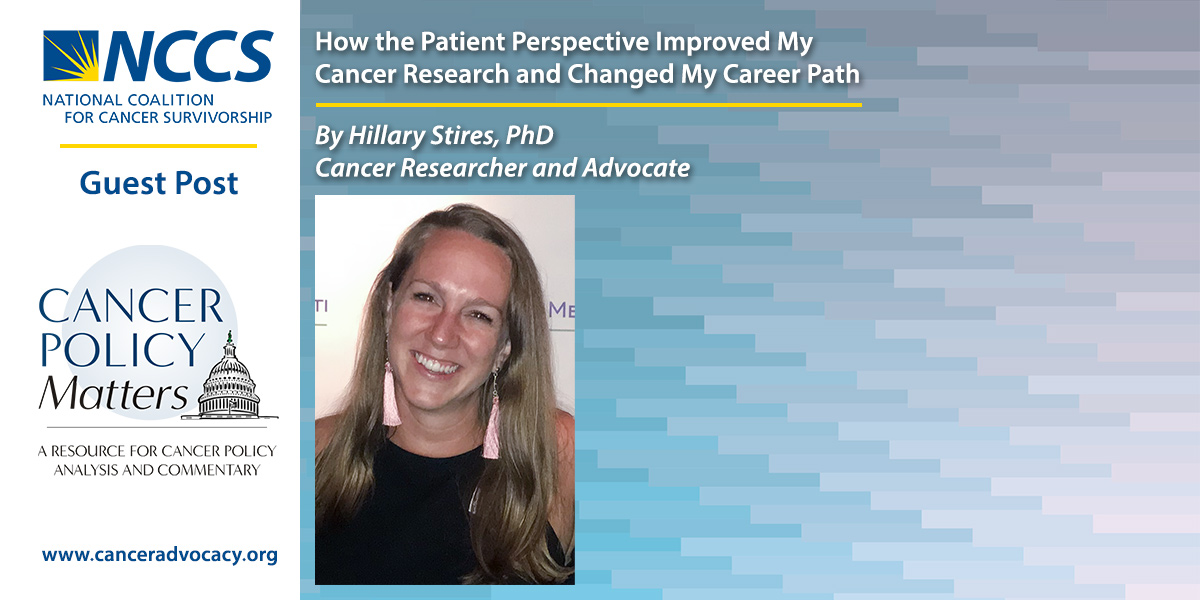How the Patient Perspective Improved My Cancer Research and Changed My Career Path
 Guest Post by Hillary Stires, PhD
Guest Post by Hillary Stires, PhDCancer Researcher and AdvocateThe first time I heard the words “you have cancer,” I was sitting in the doctor’s office with my best friend Katie. We were both 28 years old. Katie had a lump removed from her breast the Monday before Thanksgiving and I was home in New Jersey a few days before the holiday to hang out with her post surgery. We were supposed to go to DSW that Wednesday morning when she got a call that her doctor wanted to see her that day.
I collapsed on the floor of my parent’s kitchen, weeping in anticipation of what we were about to embark on.
During the previous 6 months, I had been studying breast cancer as a postdoctoral fellow at Georgetown University’s Lombardi Comprehensive Cancer Center. The 6 years before that I studied at Rutgers University earning my PhD focused on breast cancer. I thought those experiences would have prepared me more for Katie’s diagnosis. Instead, I felt completely lost.
I was amazed at how little I’d actually learned about how cancer affects the person as a whole during my six years of training. For example, I could tell you how the HER2 protein makes cells grow and divide, but I didn’t know the side effects of the therapies that blocked this process or the normal course of treatment. After spending the holidays in New Jersey, including an extended week going to chemo with Katie, I returned to Washington, DC to write grants and continue my postdoc.
To be fair, I started working with patient advocates just before Katie’s diagnosis — I presented my work to the Georgetown Breast Cancer Advocates (GBCA) a few months after starting at Lombardi and submitted a Susan G. Komen grant that required a patient advocate mentor. I’d also started tweeting with #BCSM (Breast Cancer Social Media) on Monday nights, which was a surprise blessing as that community became my support system following Katie’s diagnosis.
Over time, Katie’s treatments came to an end, but I continued working with patient advocates online and in person. I attended conferences and sat with the patient advocates instead of my scientist peers, where I was able to explain complicated concepts about breast cancer and helped clarify confusing topics. I noticed that working with advocates was transforming my research, and ultimately my career, as I began to factor in the human aspect of cancer into my research. More importantly, I realized that I was one of a few research scientists engaging in this kind of patient-based work. This led me to explore ways to improve relationships between patient advocates and researchers so other scientists could experience similar benefits.
I started following the National Coalition for Cancer Survivorship (NCCS) on Twitter after I met some of the #BCSM crew at a live “tweet up” in DC during the NCCS Cancer Policy and Advocacy Team (CPAT) Symposium in 2018. I was amazed at how much the mission resonated with me from a personal level, but also as a cancer research scientist. I was already thinking about pivoting my career into health policy, but I also knew I wanted to keep building relationships between patient advocates and my community of research scientists. So, I applied to NCCS’ Elevating Survivorship program to become an Elevate Ambassador and develop a forum to encourage the development of those relationships.
The goal of my project is to build out a program for patient advocates and cancer research scientists (mostly graduate students, postdocs, and oncology fellows) to meet and learn from one another. Last month, on July 12, I oversaw the first workshop for the Cancer Trainee Advocate Program (CTAP) at Lombardi. We had all the graduate students and some of the postdocs from the tumor biology program and about 12 patient advocates – most of whom had been or were currently being treated at Lombardi.
After a presentation on the value of working together, patient advocates and research trainees had roundtable discussions with a list of questions about research, the patient perspective, and ways to work together to guide the discussion. (Many of the questions for the roundtable discussion came from the patient advocate community on Twitter — many thanks to all their support!)
The trainees presented posters about their work and advocates asked questions for clarity and about impact. Additionally, the advocates had an opportunity to walk through the research labs and see what cancer cells look like in a culture dish. The workshop was a great primer to start building relationships to improve research through collaborative grant submissions and other cancer advocacy work.
My favorite part about this program is that the goals benefit both groups: Patient advocates can share their experiences and learn about cancer research from the people completing it, and trainees improve their science communication skills when explaining their research and gain a perspective about cancer they normally don’t learn about in a classroom. The next phase is to have a few others pilot the program at their institutions. After that, I’ll work with a handful of research trainees and patient advocates to build a website and a toolkit so other institutions can emulate the program.
My hope is that many more research scientists, and not just those who hear the words “you have cancer,” will engage with cancer advocates early and often, recognize the value of these relationships, and incorporate that knowledge into their research. Not everyone confronts cancer as closely as their best friend, loved one, or themselves, and I hope fewer will. But I’m grateful for the catalyst it was in my life and my work to help facilitate more relationships between patient advocates and research scientists to improve cancer research.
# # #
About the Author: Dr. Hillary Stires completed her PhD at Rutgers University and is a postdoctoral research fellow at Georgetown University’s Lombardi Comprehensive Cancer Center, studying how hormones influence breast cancer development and therapy resistance. Because of her best friend’s breast cancer diagnosis and her experiences tweeting with patient advocates, she decided to leave academia for a career in health policy but continues to work to improve relationships between patient advocates and research scientists as an NCCS Elevate Ambassador.
You can find Dr. Stires on Twitter at @HillStirSci.
Note: The views & opinions expressed in any guest post featured on our site are those of the guest author and do not necessarily reflect the opinions & views of the National Coalition for Cancer Survivorship. Read our blog and comment policies here.



